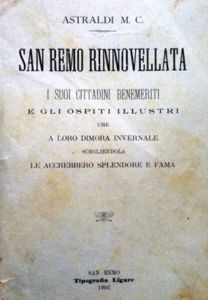Historian and playwright
 He was born in Sanremo on 12 October 1843 from Domenico and Marietta Carlo. After completing his first studies at the city college, he enrolled at the University of Turin, where he obtained a diploma as professor of Italian literature, history and georaphia. While still a student, he published a short poetic essay entitled Visione, which he read on the occasion of an anniversary of Dante and which was openly praised by the local newspaper "Sanremo".
He was born in Sanremo on 12 October 1843 from Domenico and Marietta Carlo. After completing his first studies at the city college, he enrolled at the University of Turin, where he obtained a diploma as professor of Italian literature, history and georaphia. While still a student, he published a short poetic essay entitled Visione, which he read on the occasion of an anniversary of Dante and which was openly praised by the local newspaper "Sanremo".
After completing his philosophy course, he wrote a love story in twelve chapters, which provoked various criticisms in the Matuzian literary environment.
In February 1870 he published in an issue of the "Rivista Ligure" Gemma e Linneo, a song in loose verse, while in the same years he printed a little Dante poem entitled Sanremo e l'Ombra dei suoi Grandi, in which he praised the work of those who had sacrificed themselves for the salvation of the Homeland.
After writing the comedy "Amore e sacrificio", published in Oneglia in 1869, and the drama"La mano di Dio", he composed his first tragedy "Tullia la Superba" , set in ancient Rome, followed by the five-act drama "Cola di Rienzo" tribune of the Roman people, published in Oneglia by Giovanni Ghilini in 1870.
He then sent a copy of this drama to King Vittorio Emanuele II and the Minister of Education in the hope that the government, considering the value of his work, would assign him a chair of Italian history, geography or literature in some state institution.
Shortly afterwards he also sent a copy to the famous writer and patriot Domenico Guerrazzi, who replied from Livorno on 17th September 1870 expressing his deep appreciation for the work of the young author from Sanremo.
Also in '70 he composed the tragedy "Gianni Bruto",, which was quite successful and was also performed in Sanremo on 25th March 1872.
Called to Bitonto in Apulia to teach Italian letters, history and geography, he was informed by a friend and colleague of the work of the Neapolitan poet Federico Villani, to whom he sent a copy of Cola di Rienzo, receiving also from him a letter of congratulations. His dramas were also positively evaluated in a review written by the critic Eugenio Camerini in the "Corriere di Milano" of 19 October 1870.
After being wounded by a gunshot on 22 February 1871 in Bitonto in mysterious circumstances, he began to compose "Giulio Cesare Vachero ovvero la Repubblica di Genova ed il Piemonte nel secolo XVII", a historical drama in five acts set during the war of 1625 between Genoa and the Savoy, published in Oneglia in '71.
In 1877 printed the drama in five acts "Leonilda" and two years later wrote the libretto of Gaetano Tessitore's melodrama "Elisa".
Also of considerable importance is his historiographical production, aimed at meticulously reconstructing the political, social and cultural life of Sanremo from the eighteenth century to the early twentieth century, and in particular the Risorgimento and late nineteenth century period, which he treated with great acumen and scientific rigour in his works "On civil, moral and intellectual conditions of the City of Sanremo. Historical memoirs from 1848 to 1873", exit in Oneglia for the Ghilini types in 1873, and "San Remo rinnovellata. Its well-deserving citizens and illustrious guests who to them winter residence choosing it would increase its splendour and fame", published in Sanremo by the Ligurian Printing House in 1902.
He also wrote a "Biografia del dott. Siro Andrea Carli", published in Oneglia in 1889, a Collection of Poems and Carmets, also published in Oneglia for the Ghilini types in 1884, and various epitaphs composed on the occasion of the wedding of his fellow citizens.
He was also a teacher of literary subjects in the city's institutes of higher education and also gave various public speeches, including the one on the occasion of a distribution of prizes to the students of the technical and elementary course of a Sanremo school, published in 1879 under the title "On the necessity of moral and civil education so that a nation might become strong and powerful", and the funeral eulogy of the young Regolo Calvino, pronounced in the cemetery of Sanremo on 12 April 1900.
He died in Sanremo on 9th February 1916.
In 1962, the Municipal Administration dedicated to him the dead-end street starting from Via Roglio, which is close to the buildings of the first stretch of Via San Francesco.
(source: Vite di Sanremesi Illustri di A.,Gandolfo)




